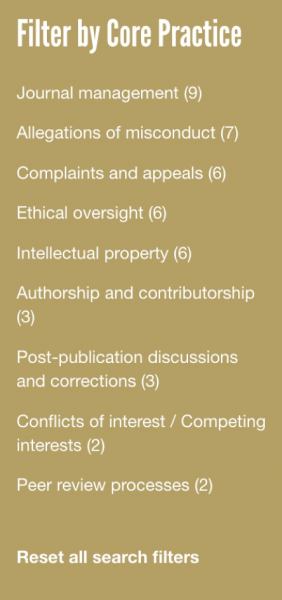In this case, a staff member at a journal noted that a handling editor and her or his favorite reviewers frequently requested authors to cite the editor’s and reviewers’ work in revised submissions. Once this was confirmed, the editor-in-chief consulted the editorial board who agreed that the requested citations were not scientifically necessary. In response to a communication about this, the handling editor resigned. The journal office and editor then put in place various educational steps for the editorial board and handling editors about this.
This month’s highlighted case illustrates how the COPE Core Practices interdigitate and how to use them to find resources that can help you. Let’s go through how you might get help with a similar problem. First, examine the list and descriptions of the Core Practices. There are four that apply to this case and these are identified on the case classifications:
Allegations of misconduct
Journals should have a clearly described process for handling allegations, however they are brought to the journal's or publisher’s attention. Journals must take seriously allegations of misconduct pre-publication and post-publication. Policies should include how to handle allegations from whistleblowers.
Complaints and Appeals
Journals should have a clearly described process for handling complaints against the journal, its staff, editorial board or publisher.
Journal management
A well-described and implemented infrastructure is essential, including the business model, policies, processes and software for efficient running of an editorially independent journal, as well as the efficient management and training of editorial boards and editorial and publishing staff.
Peer review processes
All peer review processes must be transparently described and well managed. Journals should provide training for editors and reviewers and have policies on diverse aspects of peer review, especially with respect to adoption of appropriate models of review and processes for handling conflicts of interest, appeals and disputes that may arise in peer review.

 On the description of the Core Practices, click on the relevant ones and you will be directed to other resources, such as cases, flowcharts, seminars and webinars, guidelines, discussion documents and eLearning that relate to that practice. There are currently almost 600 cases on the website. By using this method, you can make quick work to scan these lists to look for informative cases and decide if an individual case is helpful. Several cases may show up in more than one list, affirming the overlap of some Core Practices. Or you can browse for the type of resource you are interested in and once that is open, filter by the relevant Core Practice.
On the description of the Core Practices, click on the relevant ones and you will be directed to other resources, such as cases, flowcharts, seminars and webinars, guidelines, discussion documents and eLearning that relate to that practice. There are currently almost 600 cases on the website. By using this method, you can make quick work to scan these lists to look for informative cases and decide if an individual case is helpful. Several cases may show up in more than one list, affirming the overlap of some Core Practices. Or you can browse for the type of resource you are interested in and once that is open, filter by the relevant Core Practice.
Case discussion
For our exemplar case, I found no other cases, guidelines or flowcharts related specifically to this case. However, this systematic review of the available resources did result in the identification of a discussion document “Citation Manipulation” from the COPE Forum December 2012 that does indirectly address this topic. This discussion addresses the circumstance in which “an editor or others affiliated with a journal pressure an author to add citations from that journal for the implied purpose of increasing citation rates, and by extension, journal impact factor”. While our case doesn’t specifically state that the editor’s and reviewers' papers were published in the journal in question and so the gaming of the journal impact factor may not have been the underlying motive, the same principles apply. References that do not contribute to the scholarly content of the paper should not be included. Within the blog posts following the Forum, one entry suggests that authors should be empowered to notify the editorial officers if they feel “leant upon” by editors to include citations. This may prove to be a useful suggestion to you if you are dealing with an issue similar to this case.
Lastly, by using the search bar, you can enter keywords related to the problem at hand. For instance, entering “citations” in the search bar returns 86 items. The second one, a Guest Post from the August 8, 2018 Digest by Marie McVeigh and Nandita Quaderi entitled Citations: Link, Locate, Discover, Connect is a thorough overview of many aspects of citations. Relevant to our case, the authors discuss self-citation and the role of the community in managing citation ethics.
We are working on a Citation Manipulation discussion document which will be ready, on our website, early this year.
Nancy Chescheir on behalf of the COPE Education Subcommittee
Read January 2019 COPE Digest newsletter and use the COPE Audit Tool, read a case discussion on citation manipulation, get dates in the diary for COPE events in 2019, and keep abreast of news & events in #PublicationEthics